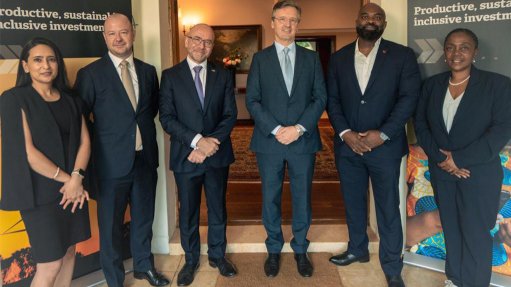
From left to right are BII climate manager Saphira Patel, British High Commission economic counsellor Mike Foster, British Deputy High Commissioner to South Africa Adam Bye, BII CEO Nick O'Donohoe, BII Africa head and MD Chris Chijiuotomi and BII South Africa coverage director Thithi Kuhlase-Maseko
UK development finance institution (DFI) British International Investment (BII) will invest R125-million in two 140 MW wind farms in the Northern Cape and Eastern Cape to help tackle South Africa’s energy crisis and accelerate economic growth.
The two wind farms are currently under construction, are expected to reach completion in 2024 and will provide clean, affordable energy to South Africa. This is part of a three-project cluster being co-developed by renewable energy investment company H1 Capital and energy company EDF Renewables.
South Africa faces a severe energy crisis, which affects the safety and productivity of everyday life. In 2022, electricity cuts averaged eight hours a day. Outages experienced by South Africa cost the continent 2% to 4% of its gross domestic product a year, according to the findings of an African Development Bank study.
Further, in support of a just energy transition, BII has partnered with H1 Holdings and renewable power producer Scatec to launch three solar and battery storage facilities in Kenhardt, in the Northern Cape, under South Africa’s Risk Mitigation Independent Power Producer Procurement Programme.
BII is also backing strategic energy platforms, including renewable power companies Globeleq, Gridworks, ACWA and Redstone, which demonstrates the UK’s focus on actively helping economies to reduce emissions and maximise the delivery of consistent and clean power to South Africa’s cities, villages, townships, businesses and farms, thereby providing a major boost to productivity and economic growth, the DFI said.
Additionally, it recognises that investing in digital infrastructure, digitally enabled businesses and technology-led innovation can have a disproportionately positive effect in addressing key development challenges, particularly in South Africa, where the digital gap is significant, with broadband in only 10% of households.
Digitalisation also advances climate technologies with renewable power, such as solar, wind and battery energy storage systems. Marking its commitment to meaningfully increase energy access, nearly half of BII’s investments in 2022 were in climate finance and were valued at £591-million.
BII has partnered with telecommunications network company Liquid Intelligent Solutions, which has 100 000 km of fibreoptic network in Africa, and financial services firm Tyme Bank, it said.
BII’s ambition is to help solve pressing development challenges in South Africa, including reliable clean energy, said BII CEO Nick O’Donohoe.
“BII has a long-term commitment to partner with promising businesses and ambitious entrepreneurs in South Africa. We committed more than $5.5-billion to Africa in our past five-year strategy period.
“BII’s strategic objective in South Africa is to invest its patient, long-term capital to continue to meet the needs of those whose mission and purpose strive for equality, inclusive economic growth and a more sustainable future,” he said.